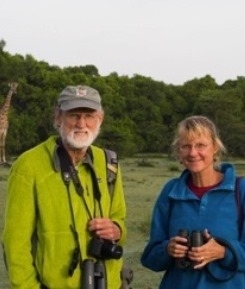
Empowering People to Protect and Conserve Wildlife
Editor’s note: Across the world, many scientists and nature enthusiasts worry about Earth’s natural habitats and yearn to protect and conserve wildlife for future generations. In honor of Parks and Recreation Month this July, we’re spotlighting the work of Life Net Nature — an organization set up by wife and husband duo Dr. Dusti Becker and Dr. Tony Povilitis that works with volunteers to do just that.
Dusti and her husband Tony are conservation biologists — they study ways to maintain and restore habitats while protecting our planet’s wildlife. They first started working with volunteers as principal investigators at Earthwatch Institute in the 1990s, where they brought volunteers along on conservation biology research projects in Chile, Costa Rica, and Ecuador. In 2008, they began engaging volunteers at their own nonprofit, Life Net Nature.
Volunteers have been the backbone of their work throughout all those years.
“Volunteers bring fresh ideas and high energy to a research project. Most are willing to help in every way they possibly can and bring optimism and positive ideas to a project. Wildlife research can be lonely, but not with a team of volunteers helping!” says Dusti.
This year, Life Net Nature is hosting three projects for 24 volunteers. Besides conservation websites and word-of-mouth, VolunteerMatch helps Dusti and Tony get these opportunities in front of people who are interested in wildlife conservation.
Dusti loves how volunteers can choose the projects close to their heart when they search from 29 different causes on VolunteerMatch. She told us, “While I am mainly concerned with wildlife conservation, I am also trained as a science teacher so I feel a calling to help with education. If I were personally planning to volunteer, I would seek projects that combine nature conservation and education.”
Volunteers with Life Net Nature are helping make important discoveries about tropical birds, while learning to mist net and band birds. What does this mean? Mist nets are almost invisible nets that are used to catch birds. Volunteers learn how to carefully take the birds out of the nets and bring them to a banding station, where an aluminum band with numbers is attached to the bird's leg. Banding also includes weighing and measuring the bird, along with other physical checks. After the short stay at the banding station, the bird is released to get on with its life.
Life Net Nature also encourages locals to support protected areas. This can be through taking part in a community meeting, or simply by spending time informally chatting with local people about the concept and potential benefits of protected areas.
In Ecuador, volunteers helped provide the data required to convert the Loma Alta watershed into an international Important Bird Area (IBA). “There's no end to what one person can contribute as a volunteer!” adds Dusti.
This June, Life Net Nature was in Kenya with seven volunteers working with the Maasai people to protect elephant corridors and giraffe nursery habitats. They’re heading to Ecuador in July to monitor birds alongside a team of eight volunteers. And in August, they’ll head to the outskirts of Yellowstone National Park to advocate for an end to the trophy hunting of wolves.
Has Life Net Nature’s conservation work peaked your interest? Apply to spend your winter helping them with a bird banding project in Ecuador this December 4-17, or find an opportunity to protect the environment in your community.
